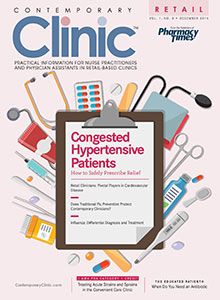Is Psoriasis Severity Linked to Vascular Inflammation?
The National Psoriasis Foundation reports that as many as 7.5 million Americans suffer from psoriasis, an autoimmune inflammatory disease.
The National Psoriasis Foundation reports that as many as 7.5 million Americans suffer from psoriasis, an autoimmune inflammatory disease. The disease often carries with it a burden of quality-of-life impairment. Psoriasis has been linked to sometimes fatal cardiovascular complications in recent years. In fact, research published in theJournal of the American Heart Associationhas shown that mild and severe psoriasis are associated with increased risk of myocardial infarction and stroke, with severe psoriasis also increasing the risk of cardiovascular mortality.
A recent study published inArteriosclerosis, Thrombosis, and Vascular Biologyset out to determine the relationship between vascular inflammation, a risk factor for cardiovascular disease, and psoriasis severity using18F-fluorodeoxyglucose positron emission tomography. The study results revealed that participants who had psoriasis had increased arterial inflammation versus controls with a target-to-background ratio of 1.8 and 1.6, respectively.
Psoriasis severity was shown to have a statistically significant link to vascular inflammation: the more severe the disease, the more inflammation. In addition, cytokines and neutrophils were found in increased concentrations in patients with psoriasis compared with controls.
The results from this study show that with increased psoriasis severity comes increased inflammation, which may lead to cardiovascular morbidity and mortality. This may be due to a shared immune-mediated mechanism.
Inflammatory mediators produced by psoriatic plaques can reach systemic circulation, thereby affecting surrounding tissues and leading to vascular inflammation and atherosclerotic disease. Further studies should help determine whether treating psoriasis decreases vascular inflammation.

Knock Out Aches and Pains From Cold
October 30th 2019The symptoms associated with colds, most commonly congestion, coughing, sneezing, and sore throats, are the body's response when a virus exerts its effects on the immune system. Cold symptoms peak at about 1 to 2 days and last 7 to 10 days but can last up to 3 weeks.
COPD: Should a Clinician Treat or Refer?
October 27th 2019The Global Initiative for Chronic Obstructive Lung Disease (GOLD) defines the condition as follows: “COPD is a common, preventable, and treatable disease that is characterized by persistent respiratory symptoms and airflow limitation that is due to airway and/or alveolar abnormalities usually caused by significant exposure to noxious particles or gases.â€
Diabetic Ketoacidosis Is Preventable With Proper Treatment
October 24th 2019Cancer, diabetes, and heart disease account for a large portion of the $3.3 trillion annual US health care expenditures. In fact, 90% of these expenditures are due to chronic conditions. About 23 million people in the United States have diabetes, 7 million have undiagnosed diabetes, and 83 million have prediabetes.
What Are the Latest Influenza Vaccine Recommendations?
October 21st 2019Clinicians should recommend routine yearly influenza vaccinations for everyone 6 months or older who has no contraindications for the 2019-2020 influenza season starting at the end of October, according to the Advisory Committee on Immunization Practices.
What Is the Best Way to Treat Pharyngitis?
October 18th 2019There are many different causes of throat discomfort, but patients commonly associate a sore throat with an infection and may think that they need antibiotics. This unfortunately leads to unnecessary antibiotic prescribing when clinicians do not apply evidence-based practice.
